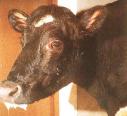Japanese cows suspected of having mad cow disease
Forty-five cows at a farm in northern Japan are suspected of having mad cow disease and will be destroyed, officials said Thursday.

A cow that died at the farm on the northern island of Hokkaido was confirmed on Jan. 24 to be Japan's 22nd case of the disease. It was not raised for food and posed no danger to the country's beef supply, officials said.
Following that death, the Hokkaido government banned the farm from moving any of its 432 cows, Hokkaido prefectural (state) official Osamu Terada said.
On Thursday, Hokkaido officials determined that 43 adult cows and two calves at the farm are suspected of having mad cow disease and will be incinerated, the prefecture said in a statement. The two calves were born from the cow that died earlier.
The dead cow was found to have been fed with meat-and-bone meal _ the first known use of such feed in Japan since it was banned in 2001, Terada said.
Officials were investigating how the meal came to be used for the cow, which died on Jan. 20, he said.
After confirming its first case of mad cow disease in 2001, Japan began testing every domestically slaughtered cow entering the market and banned the use of meat-and-bone meal made from ruminant animal parts because of the possibility that they could transmit the disease.
Japan halted all imports of U.S. beef last month after discovering backbones in a shipment of American veal. The bones are deemed to be at risk of mad cow disease and are banned under a deal that reopened the Japanese market to U.S. beef in December.
The recent import halt was a harsh turnaround for the U.S. beef business in Japan. Tokyo banned American beef in December 2003 after the first U.S. case of mad cow disease, and lifted the embargo only in December last year, reports the AP.
I.L.
Subscribe to Pravda.Ru Telegram channel, Facebook, RSS!


